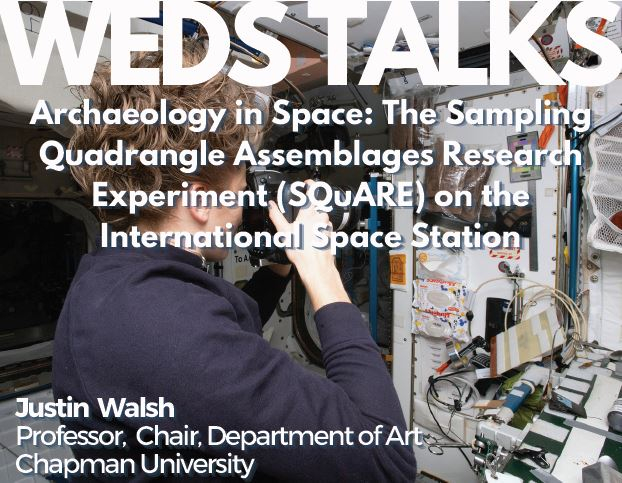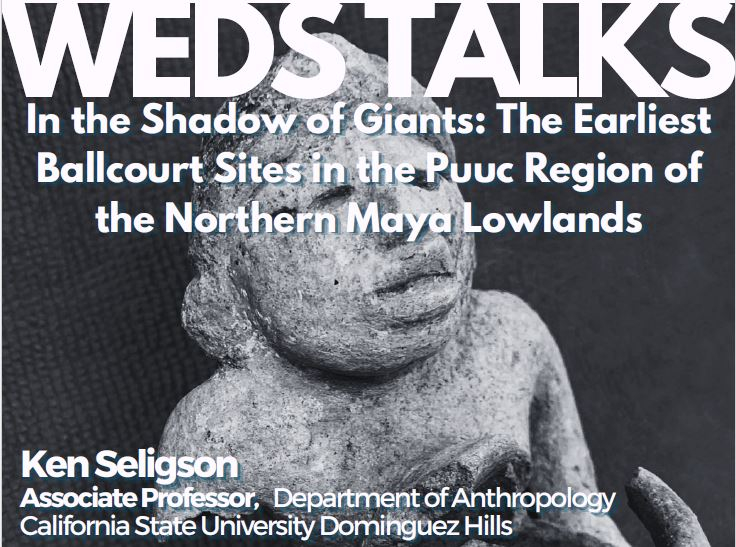Past Events
Interested in Cotsen events? Sign up for our mailing list.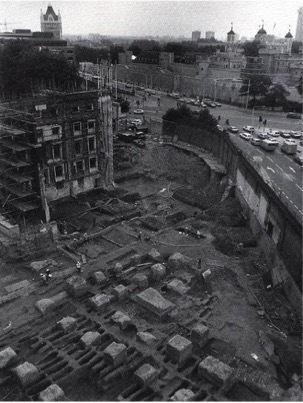 In the 14th-century, Afro-Eurasia was struck by a devastating pandemic of bubonic plague, now often called the Black Death, that killed an estimated 30-60% of some populations. Dr. DeWitte will discuss her bioarchaeological research, focusing on the skeletal remains of people who died before, during, and after the Black Death in London, England. This work aims to clarify the biosocial factors that shaped vulnerability to historical plague mortality and deepen the scope of understanding of the social and health interactions that shape epidemic disease experiences and outcomes. Analysis of demographic trends before and after the Black Death in London has revealed evidence of declines in life expectancies and, by inference, health for people before the Black Death, but improvements in health afterwards. Examination of patterns of skeletal indicators of stress reveal differences between males and females, which might reflect variation in sensitivity to stressors or differences in dietary resources in the aftermath of the Black Death. Dr. DeWitte will also highlight future directions in medieval plague bioarchaeology.
In the 14th-century, Afro-Eurasia was struck by a devastating pandemic of bubonic plague, now often called the Black Death, that killed an estimated 30-60% of some populations. Dr. DeWitte will discuss her bioarchaeological research, focusing on the skeletal remains of people who died before, during, and after the Black Death in London, England. This work aims to clarify the biosocial factors that shaped vulnerability to historical plague mortality and deepen the scope of understanding of the social and health interactions that shape epidemic disease experiences and outcomes. Analysis of demographic trends before and after the Black Death in London has revealed evidence of declines in life expectancies and, by inference, health for people before the Black Death, but improvements in health afterwards. Examination of patterns of skeletal indicators of stress reveal differences between males and females, which might reflect variation in sensitivity to stressors or differences in dietary resources in the aftermath of the Black Death. Dr. DeWitte will also highlight future directions in medieval plague bioarchaeology.
6pm Lecture
7pm Reception
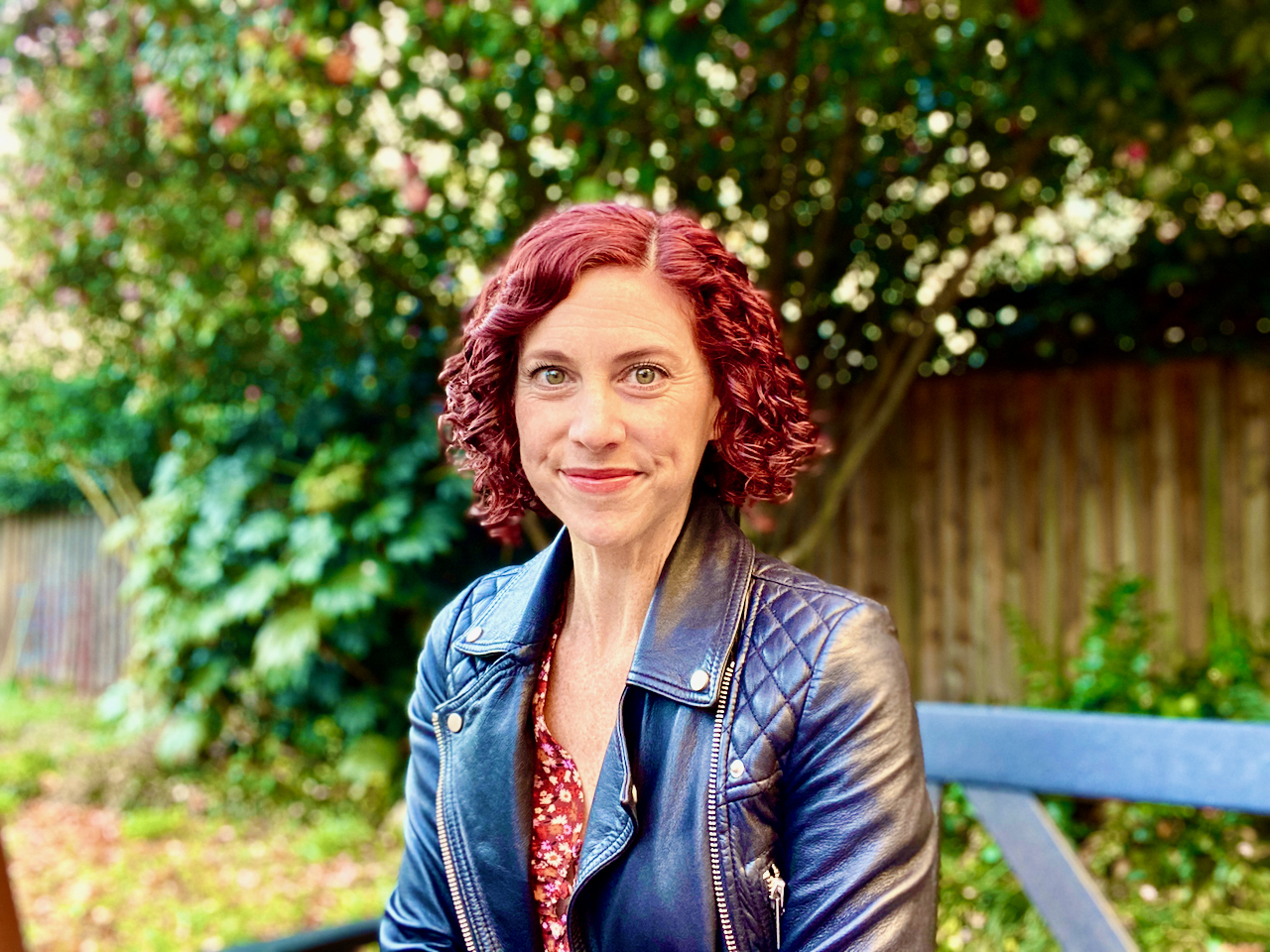 Sharon DeWitte (PhD. 2006, Pennsylvania State University) is a Professor in the Institute of Behavioral Science and Department of Anthropology at the University of Colorado, Boulder and a fellow of the American Association for the Advancement of Science. She is a biological anthropologist who specializes in the reconstruction of demography and health using human skeletal remains ethically excavated and curated from archaeological sites. She is particularly interested in infectious diseases and famine conditions in the past, and focuses on determining how factors such as sex, gender, social status, health, developmental stress, nutritional status, and geographic origin affected risks of mortality during such crises. Her research primarily focuses on mortality patterns during medieval plague epidemics in Europe and Central Asia. She is also generally interested in expanding the tools available to bioarchaeologists to examine health in the past in ways that put them in dialogue with scholars studying living people.
Sharon DeWitte (PhD. 2006, Pennsylvania State University) is a Professor in the Institute of Behavioral Science and Department of Anthropology at the University of Colorado, Boulder and a fellow of the American Association for the Advancement of Science. She is a biological anthropologist who specializes in the reconstruction of demography and health using human skeletal remains ethically excavated and curated from archaeological sites. She is particularly interested in infectious diseases and famine conditions in the past, and focuses on determining how factors such as sex, gender, social status, health, developmental stress, nutritional status, and geographic origin affected risks of mortality during such crises. Her research primarily focuses on mortality patterns during medieval plague epidemics in Europe and Central Asia. She is also generally interested in expanding the tools available to bioarchaeologists to examine health in the past in ways that put them in dialogue with scholars studying living people.
Contact Michelle Jacobson
Email mjacobson@ioa.ucla.edu
Phone
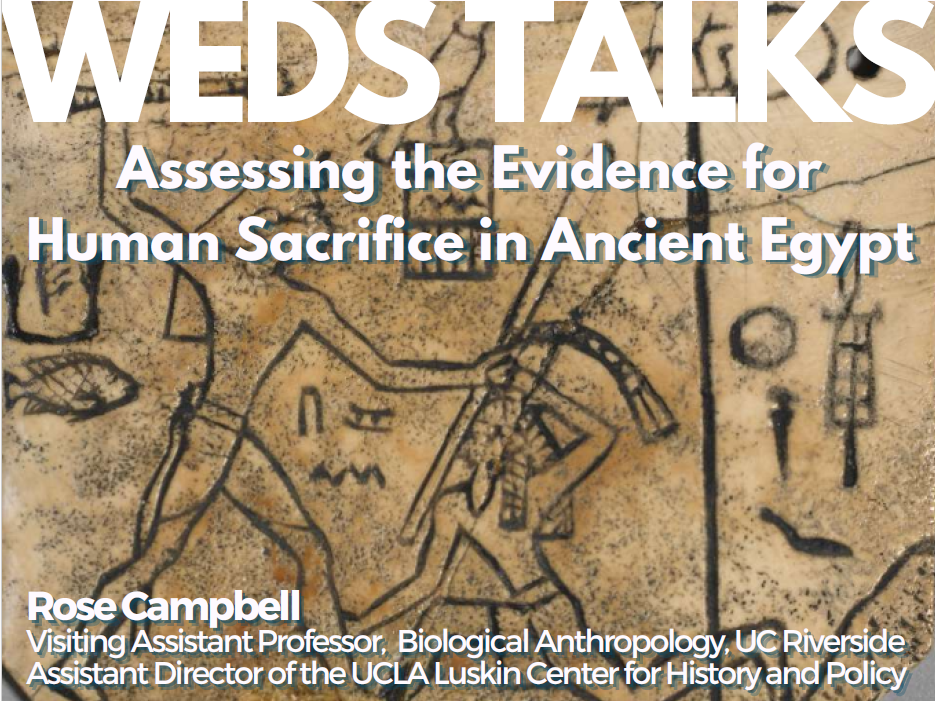
Abstract: During the 19th century, archaeologists in Abydos, Egypt, uncovered hundreds of small, relatively simple graves surrounding the funerary complexes of the first kings of Egypt in the 4th millennium BCE. Ever since these burials were discovered, scholars have debated whether the individuals within these subsidiary burials were sacrificed to accompany their ruler into the afterlife, or were simply buried close to their royal tomb after dying naturally. Previous scholarship has largely focused on aspects of the burials as well as the political and social context of the time period, rather than assessing the human remains within the graves. This lecture will present evidence from the human remains themselves, which complicates our understanding of First Dynasty funerary practices, as well as our interpretations of state-sanctioned violence and power in the past.
Bio: Roselyn A. Campbell is an archaeologist, bioarchaeologist, and Egyptologist. She earned her PhD at the Cotsen Institute of Archaeology, and an MA in Anthropology from the University of Montana. She is currently a Visiting Assistant Professor of Biological Anthropology at the University of California, Riverside, and the Assistant Director of the UCLA Luskin Center for History and Policy. Her research focuses primarily analyzing trauma in human remains to gain an understanding of violence as a tool of power in the past, but she also researches the history of cancers in human remains and health and Egyptian funerary archaeology
Contact Sumiji Takahashi
Email sutakahashi@ioa.ucla.edu
Phone 310-825-4169
ABSTRACT: Between January and March 2022, astronauts aboard the International Space Station (ISS) performed the first archaeological work in space, the Sampling Quadrangle Assemblages Research Experiment (SQuARE). The crew of the ISS defined six sample locations (“squares”) around the ISS and documented them through daily photography over a 60-day period. Walsh will present an overview of the SQuARE payload and results from two of the six squares.
BIO: Justin Walsh is professor of art history, archaeology, and space studies at Chapman University and Ad Astra Fellow in Space Habitats and Space Anthropology at USC. Since 2015, he has been co-PI of the International Space Station Archaeological Project (ISSAP), the first investigation of the material culture of a human habitat in space. ISSAP won awards for its work in 2023 from the Archaeological Institute of America and the American Anthropological Association. In 2024, Walsh was included in the Explorers Club 50, which recognizes “explorers changing the world and extending the meaning of exploration.”
Contact Sumiji Takahashi
Email sutakahashi@ioa.ucla.edu
Phone 310-825-4169
A virtual panel discussion organized by Professor Ioanna Kakoulli, Acting Director, UCLA SNF Center for the Study of Hellenic Culture.
The Eastern Mediterranean, a cradle of ancient civilizations, stands at the precipice of an unprecedented challenge. Coastal areas, including the island of Cyprus and Greece, like other regions in the Mediterranean are witnessing the relentless advance of the sea due to climate change. Rising sea levels, heightened temperatures, extreme weather events, and marine erosion are endangering archaeological sites, Byzantine relics, and other critical historic landmarks. With climate data projecting a rise of 90 cm in sea level by 2100 in the Mediterranean, the risk to our global heritage is immediate and undeniable.
This panel aims to address/initiate discussion on two critical aspects:
- Highlighting the Threat: An in-depth look at how rising sea levels, temperature extremes, and other climate phenomena threaten cultural landmarks, particularly in low-lying coastal zones of Cyprus and Greece
- Bridging the Awareness Gap: A pressing need to use climate data in decision-making for the cultural heritage sector and enhancing awareness on the imminent risks
Speakers:
Demetrios Athanasoulis, Ephorate of Antiquities of Cyclades, Greece
Nikolas Bakirtzis, Cyprus Institute, Cyprus
Alessandra Bonazza, University of Bologna, Italy
Rohit Jigyasu, ICCROM, Rome, Italy
Anthi Kaldeli, Department of Antiquities, Cyprus
Athanasios Vafeidis, Kiel University, Germany
Nikolaos Zacharias, University of Peloponnese, Greece
Register for this Zoom event here
View additional details and a full schedule here.
This event is being held under the auspices of the Deputy Ministry of Culture of the Republic of Cyprus, the Embassy of Greece in the United States, the Embassy of the Republic of Cyprus in the United States, the Consulate General of Greece in Los Angeles and the Honorary Consulate of the Republic of Cyprus in Los Angeles. This program is co-sponsored by UCLA's Cotsen Institute of Archaeology and Global Antiquity Institute and is made possible thanks to the Stavros Niarchos Foundation (SNF).
Contact
Phone
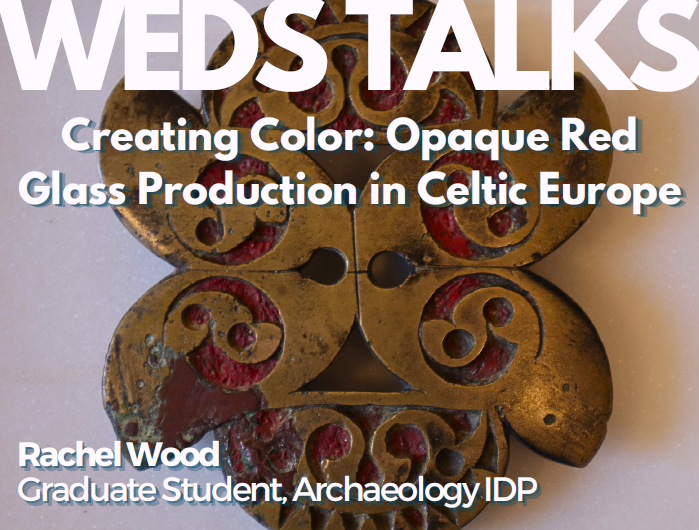
ABSTRACT: In Iron Age Celtic temperate Europe (450/400 BCE to late 1st c. BCE), opaque red glass was used in the decoration of gold, copper alloy, and iron prestige goods such as helmets, swords, fibulae, chariots, and horse equipment. Opaque red glass was difficult to produce and to work into a final product; craftspeople needed intimate knowledge of the ingredients necessary to create and color a gem-like and easily workable red glass, the correct firing temperature and furnace conditions for melting, and various techniques for application to a metal surface. In this talk, I will address the technical know-how to create opaque red glass and its many associated products discovered through the analysis of glass samples from the late Iron Age and early Roman provincial period settlement of Mont Beuvray in France and an ongoing experimental project to recreate opaque red glass.
BIO: Rachel Wood is a PhD candidate in the Archaeology IDP at UCLA. Her research focuses on the value and social networks created through the trade, production, and consumption of opaque red glass in late Iron Age and early Roman provincial western and central Europe.
Contact Sumiji Takahashi
Email sutakahashi@ioa.ucla.edu
Phone 310-825-4169
The UCLA Waystation Initiative and the Cotsen Institute of Archaeology invite you to a Waystation Workshop at UCLA on Saturday March 9, 2024. As part of a weekend of celebratory events marking the 50th anniversary of the Cotsen Institute of Archaeology, this workshop will bring together Mesoamerican specialists to engage in foreword-thinking dialogue about the restitution and protection of the region’s tangible cultural heritage.
The Waystation Initiative is a groundbreaking endeavor that organizes and facilitates the voluntary return of international archaeological and ethnographic objects to the nation or community of origin. Waystation Workshops are community engagement opportunities that offer collaborative learning and training. Through workshops, specialists present research that focuses on threats to and the protection of the world’s tangible cultural heritage.
Our March 2024 workshop will consider the history and future of repatriation and restitution of tangible cultural heritage to Mexico. The regional focus of this Waystation Workshop emerged as part of an effort to assist with the voluntary return of objects from the Museum of the Cherokee People. We have invited specialists in Mexican and Central American archeology and anthropology to assist with identifying the objects and to discuss topics relating to repatriations to those regions.
The event will begin the morning of March 9 and will include 4-5 speakers presenting perspectives on cultural heritage repatriation, decolonizing collections, provenance research, working with descendant communities and governments, and related topics. The event will be hybrid, in person and via Zoom.
Email waystation@ioa.ucla.edu for more information.
Register here
------
Speakers and Topics
Christian de Brer – Director of Conservation, Fowler Museum at UCLA
Materiality, Provenance and Restoration of Ancient West Mexican Ceramics and Next Steps for Museum-based Collections
Edith Ortiz Diaz - Instituto de Investigaciones Antropológicas, Universidad Nacional Autónoma de México
Learning and Sharing: The Museum of Tuxtepec, Oaxaca
Victoria Lyall - Frederick and Jan Mayer Curator, Art of the Ancient Americas, Denver Art Museum
The Memory of Water: The Museum Space as a Bridge between Contemporary Indigenous Communities and the Latinx Diaspora
Blanca Maldonado - Centro de Estudios Arqueológicos, El Colegio de Michoacán, A.C.
Methods for Identifying the Origin of Archaeological or Anthropological Objects
Jesse Lerner - Professor of Media Studies, Pitzer College
Sandra Rozental - Universidad Autónoma Metropolitana, Mexico
Film Screening: La Piedra Ausente (The Absent Stone)
Andrew Turner – Senior Research Specialist, Getty Research Institute
The Pre-Hispanic Art Provenance Initiative: Analysis and Mobilization of the Stendahl Art Galleries Records
Contact Lyssa Stapleton
Email waystation@ioa.ucla.edu
Phone
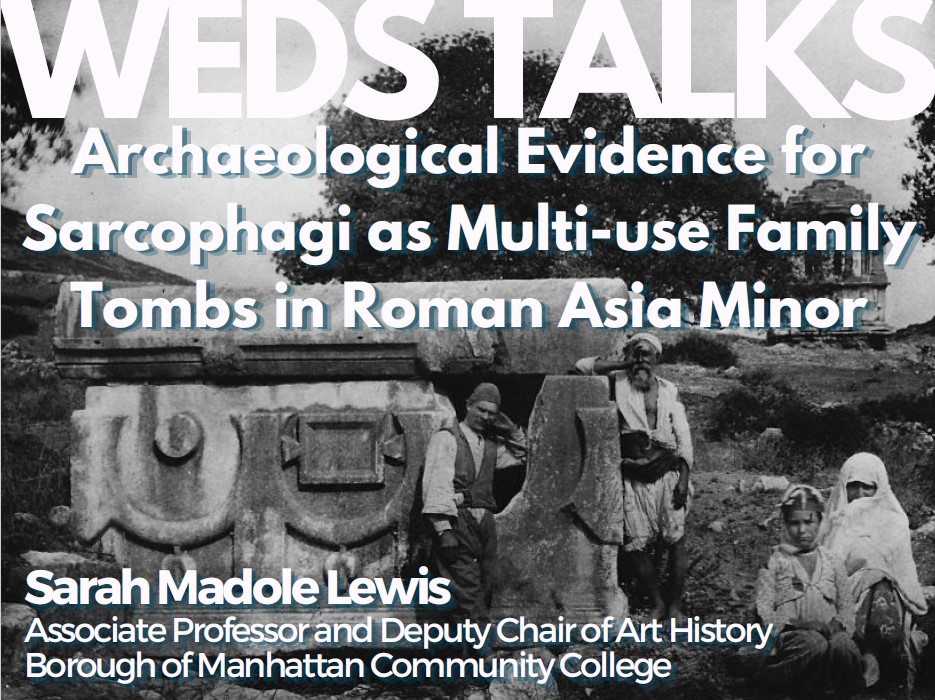
ABSTRACT: How many bodies went into sarcophagi in the eastern Mediterranean under Roman rule? Who bought monument and why? For the inhabitants of the Roman East, and in Asia Minor in particular, most patrons purchased a sarcophagus for themselves and their families, authorizing a minimum of two (and up to four) generations burial within. Yet the mortuary remains often reveal the presence of even more depositions than those specified in the texts. Using four evidentiary categories––epigraphy, skeletal remains, the structural outfitting of the sarcophagi, and iconography––I explore the phenomenon of the intended reuse of sarcophagi in Asia Minor.
BIO: Dr. Sarah Madole Lewis is Associate Professor and Deputy Chair of Art History at the Borough of Manhattan Community College (City University of New York). Her research focuses on the funerary landscapes of the ancient Roman world with a specialization on the eastern Mediterranean and the later Empire. As a current Getty Villa Research Scholar she is working on the manuscript for her book project, Roman sarcophagi in their eastern Mediterranean contexts, which examines sarcophagi from Anatolia to Cyrene during the Roman period.
Contact Sumiji Takahashi
Email sutakahashi@ioa.ucla.edu
Phone 310-825-4169
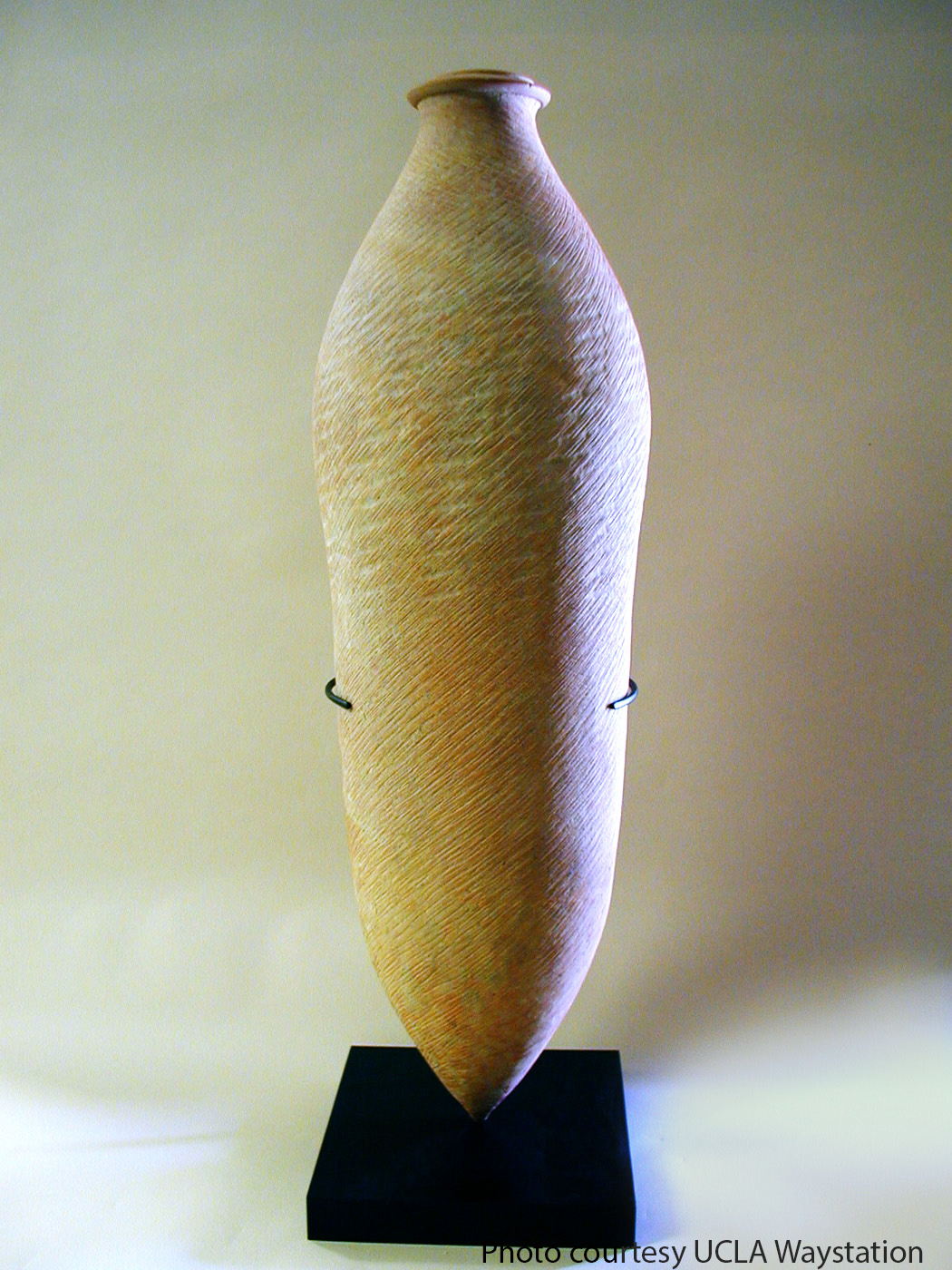 Recent studies in comparative-historical linguistics and genetics have provided valuable insights into the origins and flourishing of the Sino-Tibetan language family, one of the largest in the world. Evidence suggests that this linguistic group emerged and thrived approximately 8000-5000 years ago in the Yellow River valley, north China. Notably, the divergence of proto-Sino Tibetan languages occurred around 5900 years ago. These significant linguistic shifts coincided with archaeological findings that point to the development of the Yangshao culture and its expansion towards the Tibetan Plateau, in both westward and southwestward directions. The Yangshao culture, renowned for its centripetal settlement layouts, large public buildings, highly developed painted pottery, and the use of amphorae for producing and consuming alcoholic beverages, fostered a culture of communal ritual feasts. These communal feasting activities played a crucial role in establishing diverse social relations and reinforcing cultural identity through the production, processing, and sharing of food and alcoholic beverages. This practice emphasized collaboration and connections among related groups during the expansion of proto Sino-Tibetan populations into new territories, occurring amidst a period of climatic fluctuations.
Recent studies in comparative-historical linguistics and genetics have provided valuable insights into the origins and flourishing of the Sino-Tibetan language family, one of the largest in the world. Evidence suggests that this linguistic group emerged and thrived approximately 8000-5000 years ago in the Yellow River valley, north China. Notably, the divergence of proto-Sino Tibetan languages occurred around 5900 years ago. These significant linguistic shifts coincided with archaeological findings that point to the development of the Yangshao culture and its expansion towards the Tibetan Plateau, in both westward and southwestward directions. The Yangshao culture, renowned for its centripetal settlement layouts, large public buildings, highly developed painted pottery, and the use of amphorae for producing and consuming alcoholic beverages, fostered a culture of communal ritual feasts. These communal feasting activities played a crucial role in establishing diverse social relations and reinforcing cultural identity through the production, processing, and sharing of food and alcoholic beverages. This practice emphasized collaboration and connections among related groups during the expansion of proto Sino-Tibetan populations into new territories, occurring amidst a period of climatic fluctuations.
Li Liu is the Sir Robert Ho Tung Professor in Chinese Archaeology Stanford University. She joined the Stanford faculty in 2010. Previously, she taught archaeology at La Trobe University in Melbourne, Australia for 14 years and was elected as a Fellow of the Academy of Humanities in Australia. She has a BA in History (Archaeology Major) from Northwest University in China, an MA in Anthropology from Temple University in Philadelphia, and a PhD in Anthropology from Harvard University. Her research interests include the archaeology of early China (Neolithic and Bronze Age), ritual practice in ancient China, cultural interaction between China and other parts of the Old World, domestication of plants and animals in China, development of complex societies and state formation, settlement archaeology, and urbanism.
We gratefully acknowledge the support of the UCLA Waystation Initiative, Cyrus Tang Foundation, UCLA Center for Chinese Studies, and the UCLA Richard C. Rudolph East Asian Library.
Contact Lyssa Stapleton
Email waystation@ioa.ucla.edu
Phone
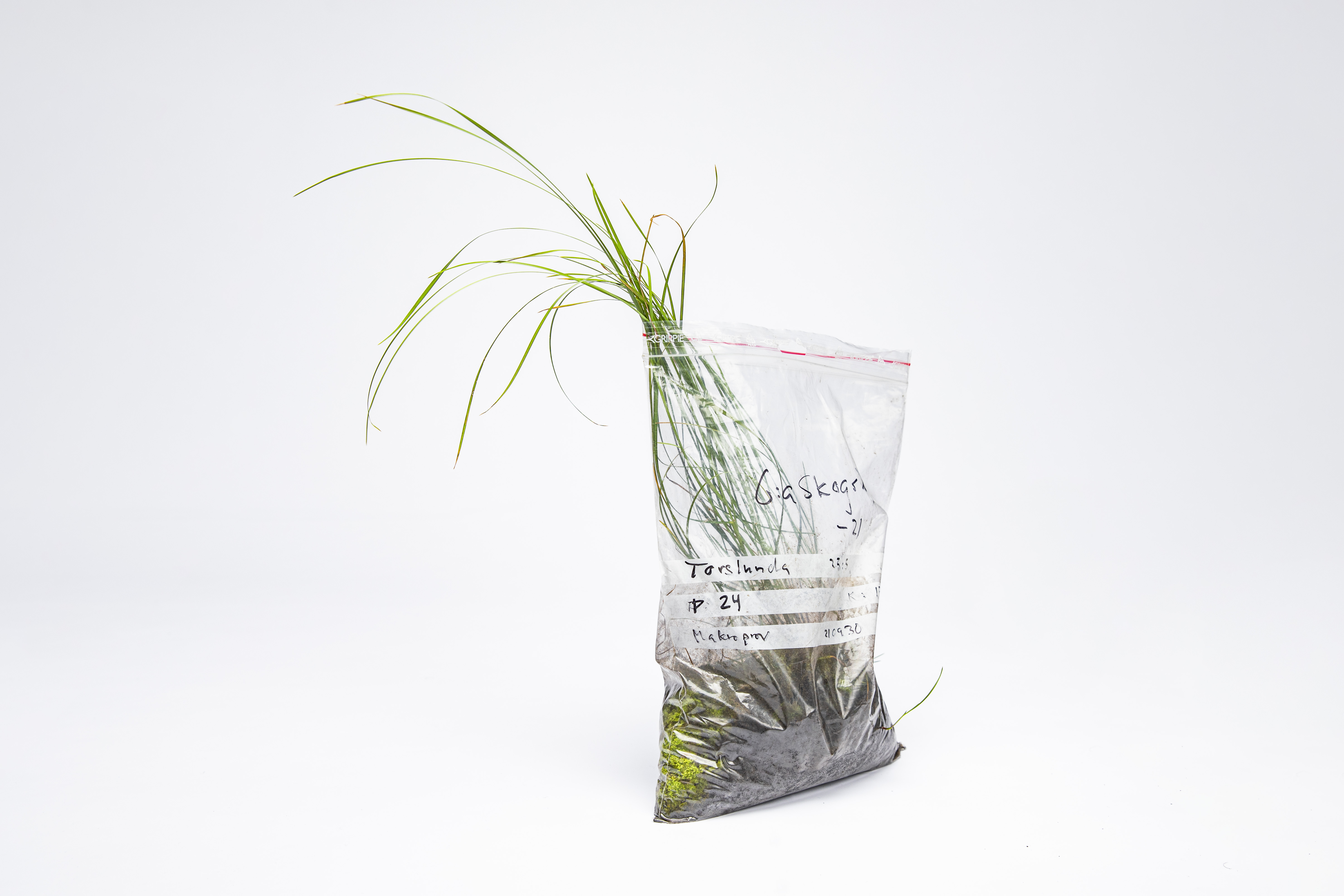 When I joined our students for their training excavation in September 2021 on the Swedish Island of Öland, it occurred to me that by focusing on the act of recovering objects and information, archaeology may be missing the most central aspect of the site. For the site was surrounded by lush vegetation and in the middle of an intense process of regeneration, involving everything from small creatures in the soil to huge trees reaching into the sky.
When I joined our students for their training excavation in September 2021 on the Swedish Island of Öland, it occurred to me that by focusing on the act of recovering objects and information, archaeology may be missing the most central aspect of the site. For the site was surrounded by lush vegetation and in the middle of an intense process of regeneration, involving everything from small creatures in the soil to huge trees reaching into the sky.
In this talk, I will trace the emergence of this insight and its implications for rethinking archaeology´s temporality and, in particular, the 1964 Venice Charter on Conservation and Restoration which has been the most influential 20th century document on policy guiding heritage conservation and restoration. I will also discuss implications for the response of archaeology to climate change, going beyond understanding long-term environmental change and safeguarding threatened sites toward developing strategies for increasing cultural resilience and sustainability. Archaeologists have long claimed to be working on the past for the benefit of future generations—now it is time to explicitly address the future and draw on the full potential of archaeology to make human societies more sustainable (while perhaps improving the life of non-human lifeforms too).
6pm Lecture
7pm Reception
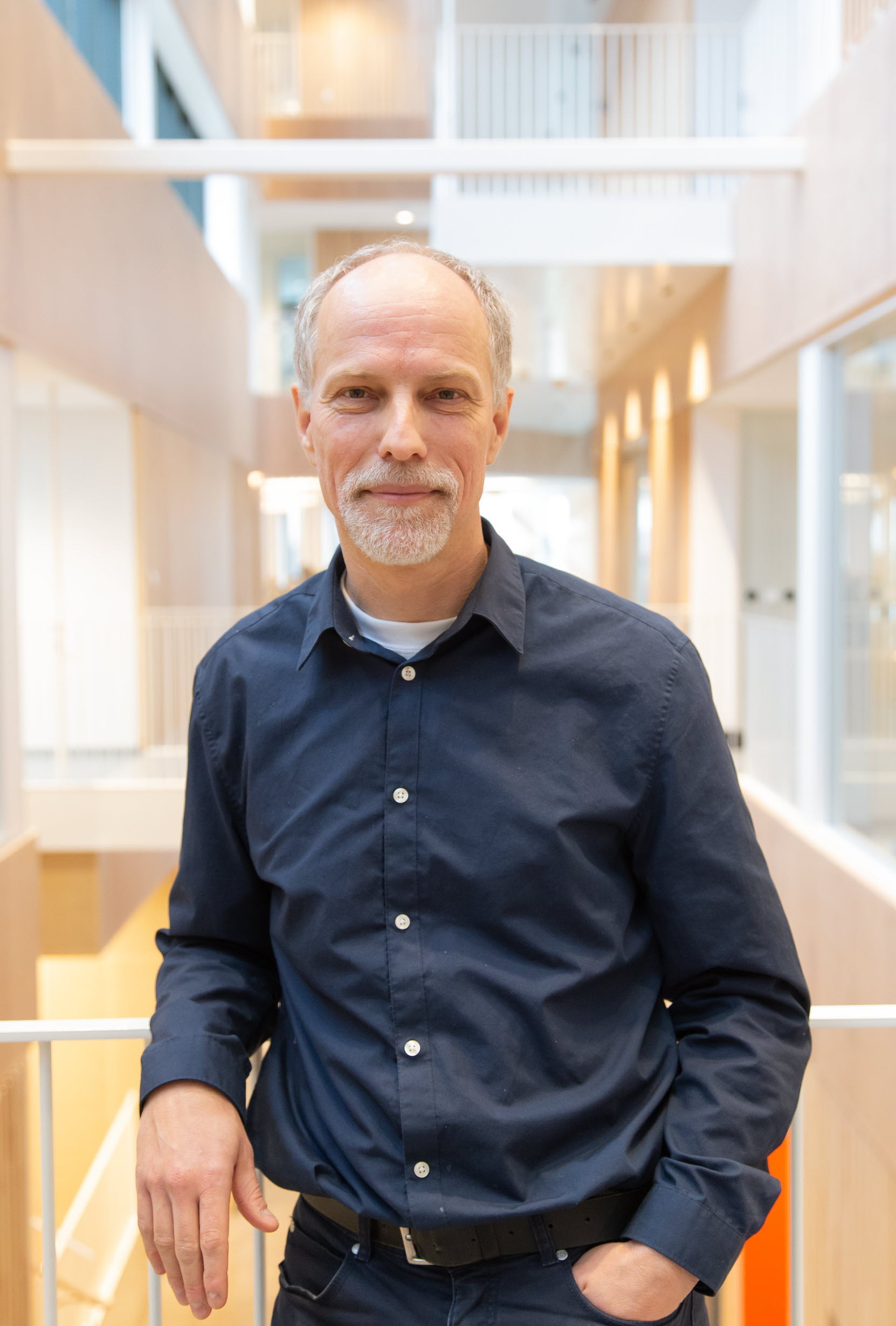 Cornelius Holtorf is Professor of Archaeology as well as Chairholder of the UNESCO Chair on Heritage Futures at Linnaeus University, Kalmar, Sweden. He studied in Germany and the UK, received a Doctorate from the University of Wales in 1998 (supervised by Michael Shanks), and has been living in Sweden for more than two decades, since 2008 in Kalmar. Since 2015, he has been directing the Graduate School in Contract Archaeology (GRASCA) comprising 9 PhD projects. He is currently a Getty Scholar working on “Heritage in Transformation”. For more information about Holtorf see http://lnu.se/en/unescochair and http://corneliusholtorf.com.
Cornelius Holtorf is Professor of Archaeology as well as Chairholder of the UNESCO Chair on Heritage Futures at Linnaeus University, Kalmar, Sweden. He studied in Germany and the UK, received a Doctorate from the University of Wales in 1998 (supervised by Michael Shanks), and has been living in Sweden for more than two decades, since 2008 in Kalmar. Since 2015, he has been directing the Graduate School in Contract Archaeology (GRASCA) comprising 9 PhD projects. He is currently a Getty Scholar working on “Heritage in Transformation”. For more information about Holtorf see http://lnu.se/en/unescochair and http://corneliusholtorf.com.
Contact Michelle Jacobson
Email mjacobson@ioa.ucla.edu
Phone
ABSTRACT: Over the past twenty years, archaeologists have come to realize that far from being a cultural backwater, the northern lowlands of the Yucatan Peninsula were integral to the development of the ancient Maya civilization. Communities constructed humongous platform mounds around the edges of the hilly Puuc Region as early as 800 BCE, at the same time that some intrepid settlers established the first farming villages within the Puuc Region itself. These earliest Puuc agricultural communities followed similar site plans that included central platform mounds and, surprisingly, full-scale ancient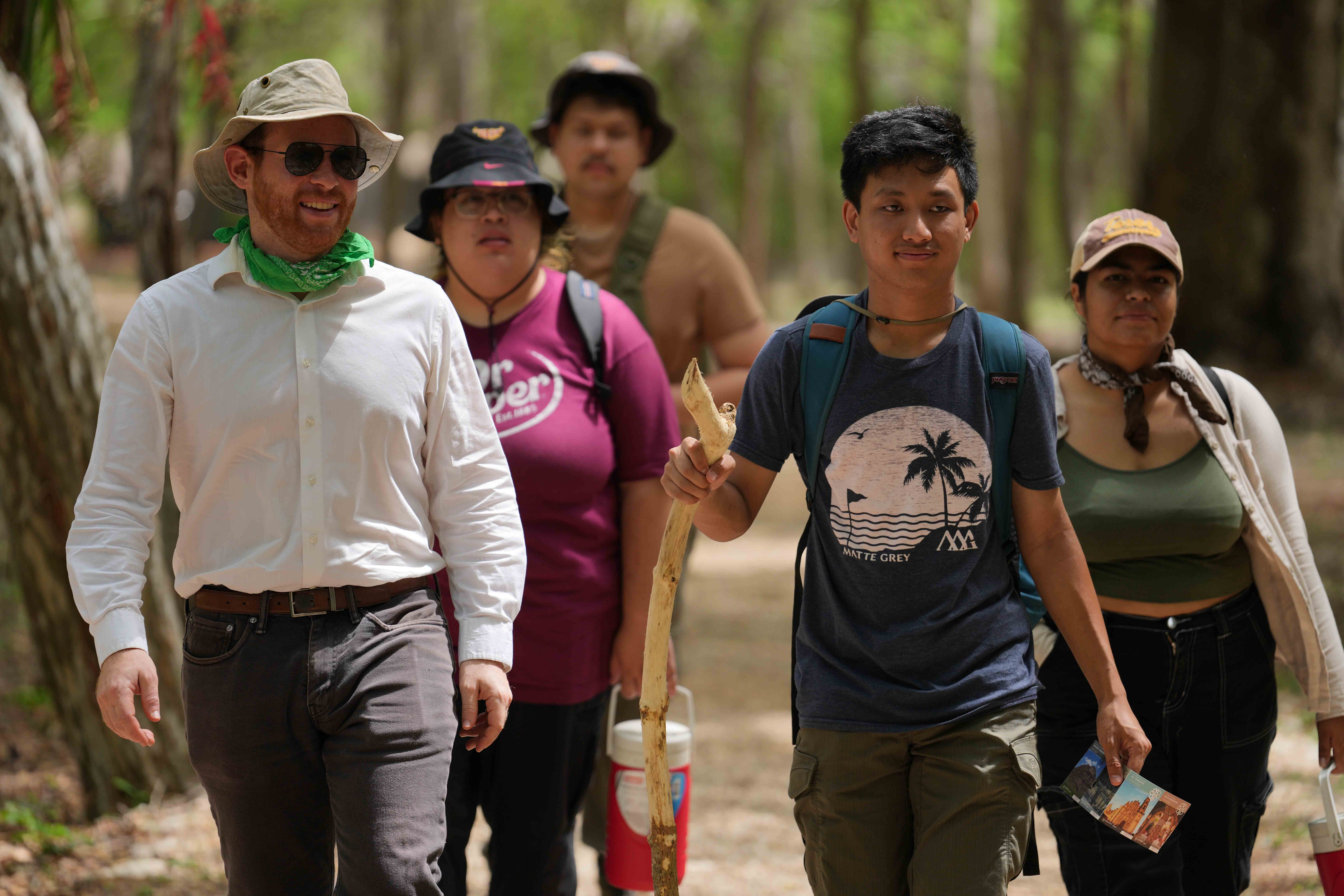
Contact Sumiji Takahashi
Email sutakahashi@ioa.ucla.edu
Phone 310-825-4169
- ‹ previous
- 7 of 51
- next ›



